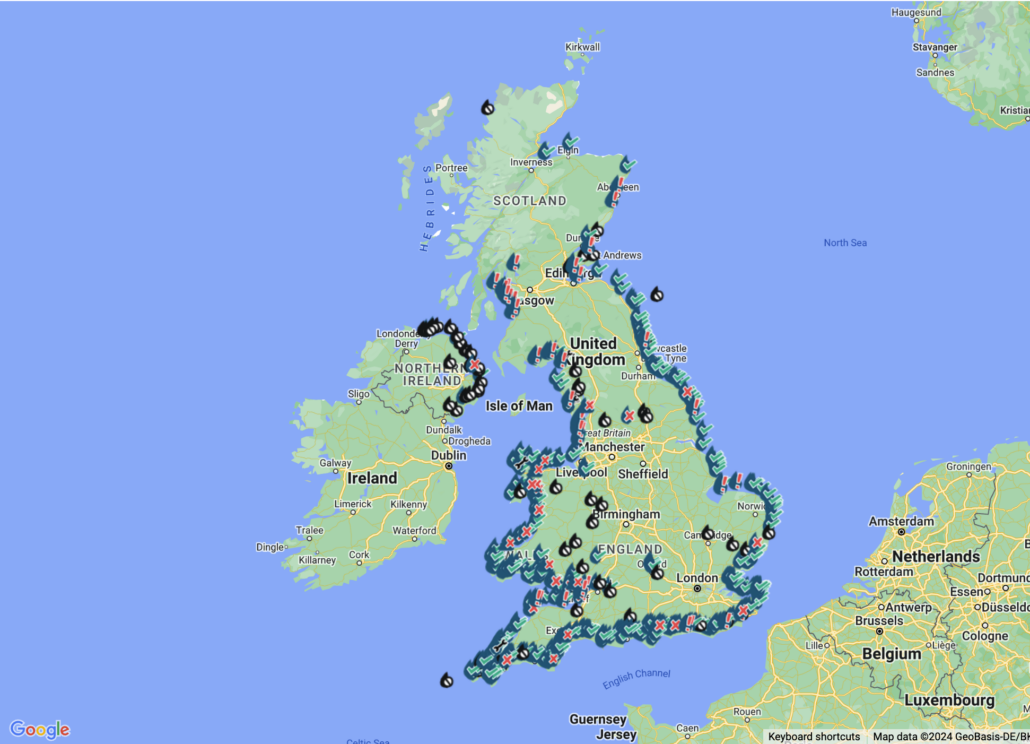When you think of a UK beach trip, you probably picture clean sand and refreshing seawater. But recently, UK beaches have faced a big problem—sewage being released into the sea. It might sound gross, but it’s happening more often than you think, causing a lot of concern for the environment and local communities. Let’s dive into why this is happening, the effects on our coasts, and how politics is involved in tackling the issue.
What Is Coastal Sewage Release?
Coastal sewage release is when untreated or partially treated sewage water is released into the sea. This usually happens after heavy rainfall when sewage systems, called combined sewage overflows (CSOs), get overwhelmed. Instead of properly treating sewage, it’s discharged into rivers and seas to prevent flooding in towns and cities. While this is legal under certain circumstances, the frequency of these releases has increased, raising alarm among environmental groups and the public.
Why Is This Happening More Often?
There are a few reasons why sewage is ending up in the sea more frequently:
- Ageing Infrastructure: Many of the UK’s sewage systems were built during the Victorian era (over 150 years ago!). These systems weren’t designed to handle the large populations and increased water usage today. As a result, they can’t always cope, especially during heavy rain.
- Climate Change: With climate change, the UK is experiencing more extreme weather, including heavier and more frequent rainfall. This puts even more pressure on the sewage systems, making sewage releases more common.
- Privatisation of Water Companies: In the 1980s, the UK’s water industry was privatised, meaning private companies now manage the water and sewage systems. Some critics argue that these companies prioritise profits over investing in modernising infrastructure, leading to more frequent sewage overflows.
Did you know?
In the 1980s, the UK privatised its water industry, allowing private companies to manage water and sewage systems and distribute profits to shareholders. Critics argue that these companies focus too much on profits and not enough on investing in infrastructure upgrades to prevent issues like sewage overflows.
The Impact on Coastal Environments
Releasing sewage into the sea doesn’t just make the water unpleasant for swimmers—it can also harm wildlife and ecosystems. Here’s how:
- Pollution: Sewage contains harmful chemicals, waste, and bacteria that can pollute the water. This can harm marine life, such as fish, shellfish, and plants in the coastal waters.
- Eutrophication: Sewage can contain nutrients like nitrogen and phosphorus, increasing algae growth. Too much algae can create “dead zones” in the water where oxygen levels drop, making it hard for other marine species to survive.
- Beach Closures: When sewage is released, beaches are often closed to protect public health. This impacts tourism and local economies that rely on visitors to the coast.
The Political Side of Sewage Releases
The issue of coastal sewage release is not just about the environment—it’s also a big political topic in the UK. Many people are frustrated with how often sewage is being released and want the government and water companies to take action. Here’s a look at how politics is playing a role:
- Public Outcry: Over the past few years, public anger has grown over sewage discharges. Environmental groups like Surfers Against Sewage have been leading campaigns, calling for water companies to be fined and held accountable for polluting the seas.
- Government Action: In response to public pressure, the UK government has introduced new rules requiring water companies to monitor and report how often they release sewage. However, some critics argue that these measures don’t go far enough and that more needs to be done to fix the problem.
- Water Companies Under Scrutiny: Water companies face increasing pressure to invest in better infrastructure. Some have been criticised for paying large dividends to shareholders while not doing enough to prevent sewage spills. Politicians and environmental activists call for tougher regulations to ensure water companies invest more in upgrading sewage systems.
What’s Being Done to Fix the Problem?
While sewage releases are still happening, steps are being taken to tackle the issue:
- Investment in Infrastructure: Water companies have promised to invest billions of pounds into modernising the sewage system to reduce the number of spills. However, this will take time, and some people believe the progress is too slow.
- Government Regulations: The UK government has introduced laws requiring water companies to reduce sewage overflows and report when and where they happen. There are also plans to create a long-term strategy to prevent sewage from entering the seas.
- Environmental Campaigns: Activist groups continue to raise awareness about the issue, and some local councils are working with these groups to find solutions that protect both the environment and public health.
Coastal sewage release in the UK is a serious issue affecting the environment and the people who enjoy the beaches. While there are political debates and efforts to fix the problem, it’s clear that more work needs to be done to protect the country’s coastline and keep the waters clean for both wildlife and humans. As awareness grows, more people are demanding action, and it’s up to the government and water companies to ensure that our beaches and seas are safe and sustainable for future generations.
Real-time coastal sewage alerts for the UK can be viewed on the Surfers Against Pollution website.


